University Assignment: Critique on Mothers' Reactions to ASD Diagnosis
VerifiedAdded on 2022/08/11
|7
|1170
|20
Report
AI Summary
This report critically examines a journal article titled "Mothers’ Reactions to Their Child’s ASD Diagnosis: Predictors That Discriminate Grief from Distress." The study, conducted by Wayment and Brookshire (2018), investigates the emotional responses of mothers to their child's Autism Spectrum Disorder (ASD) diagnosis, specifically focusing on grief and distress. The report summarizes the article's key findings, including the positive correlation between child age and grief, the impact of income and prior loss on distress, and the influence of social support. The evaluation of the article highlights its strengths, such as the use of various parameters to reach conclusions, and weaknesses, including the predominantly white sample and the limitations of the cross-sectional design. The report concludes by reiterating the significance of understanding the factors contributing to mothers' emotional experiences and the implications for parents and professionals. The article considers factors related to grief and distress reactions in mothers with children with ASD. The study examines how the child's age correlates to grief, the importance of demographic information, and the child's behavioral functionality to find important research facts. The study is limited by its use of a predominantly white population.
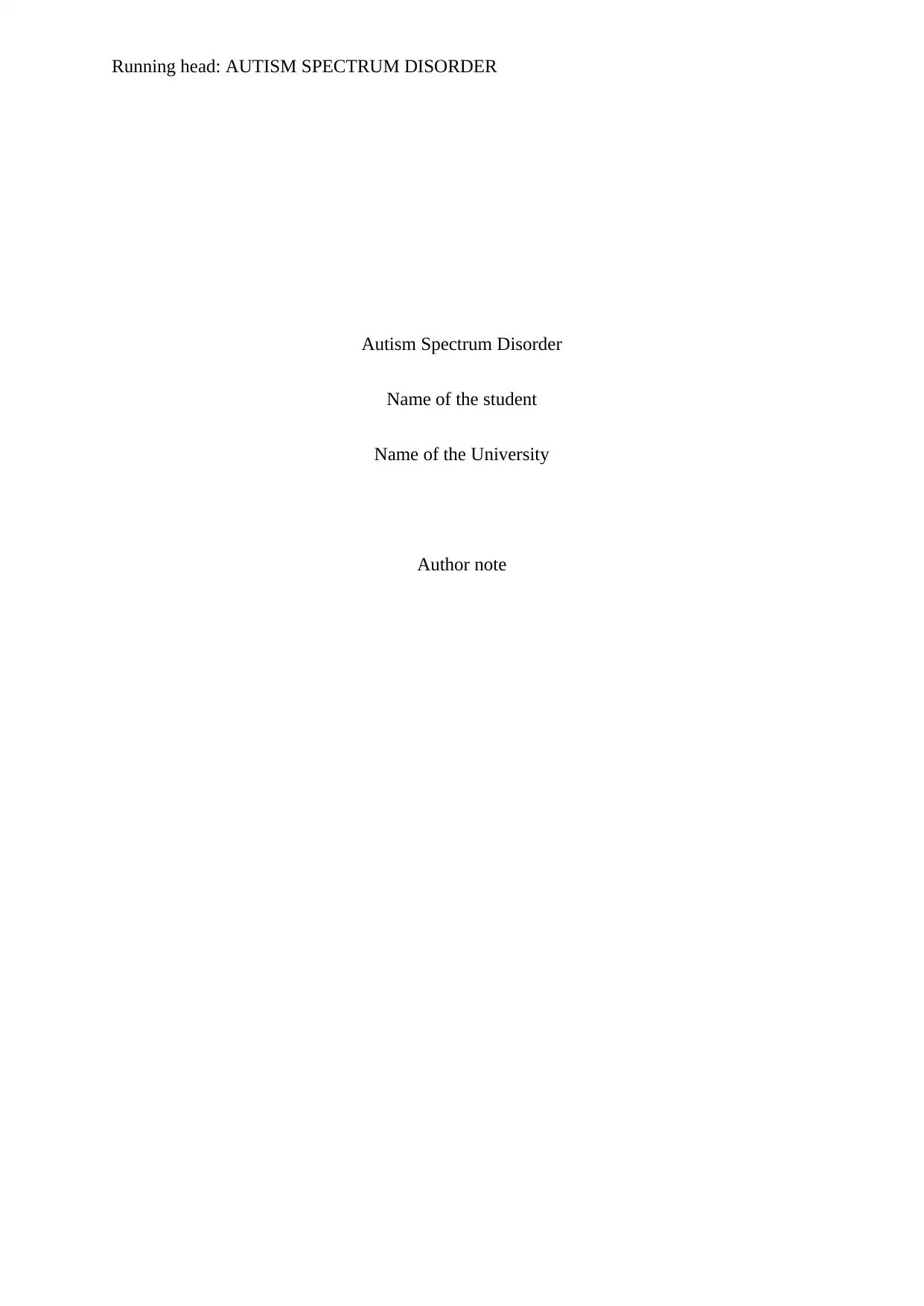
Running head: AUTISM SPECTRUM DISORDER
Autism Spectrum Disorder
Name of the student
Name of the University
Author note
Autism Spectrum Disorder
Name of the student
Name of the University
Author note
Paraphrase This Document
Need a fresh take? Get an instant paraphrase of this document with our AI Paraphraser
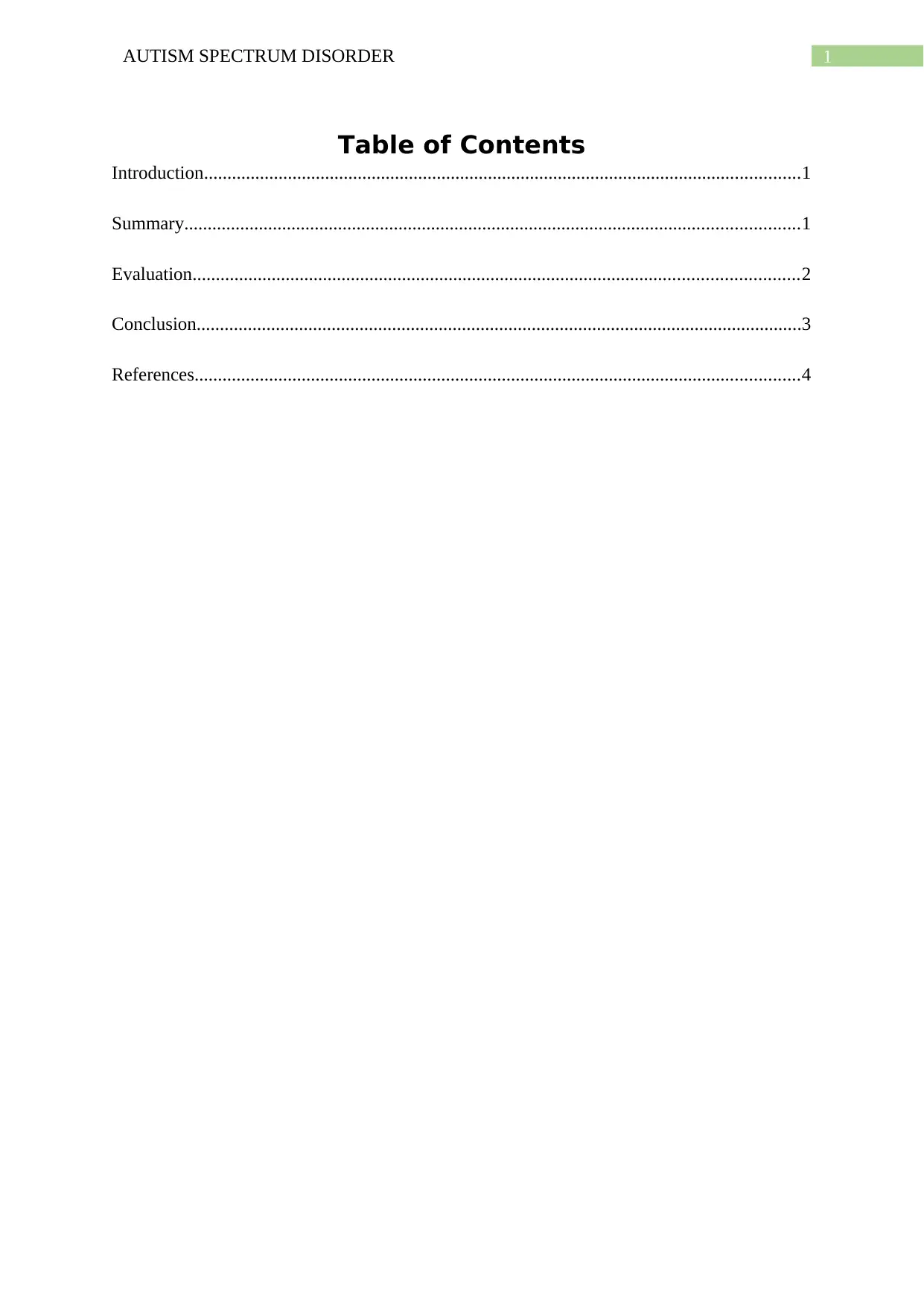
1AUTISM SPECTRUM DISORDER
Table of Contents
Introduction................................................................................................................................1
Summary....................................................................................................................................1
Evaluation..................................................................................................................................2
Conclusion..................................................................................................................................3
References..................................................................................................................................4
Table of Contents
Introduction................................................................................................................................1
Summary....................................................................................................................................1
Evaluation..................................................................................................................................2
Conclusion..................................................................................................................................3
References..................................................................................................................................4
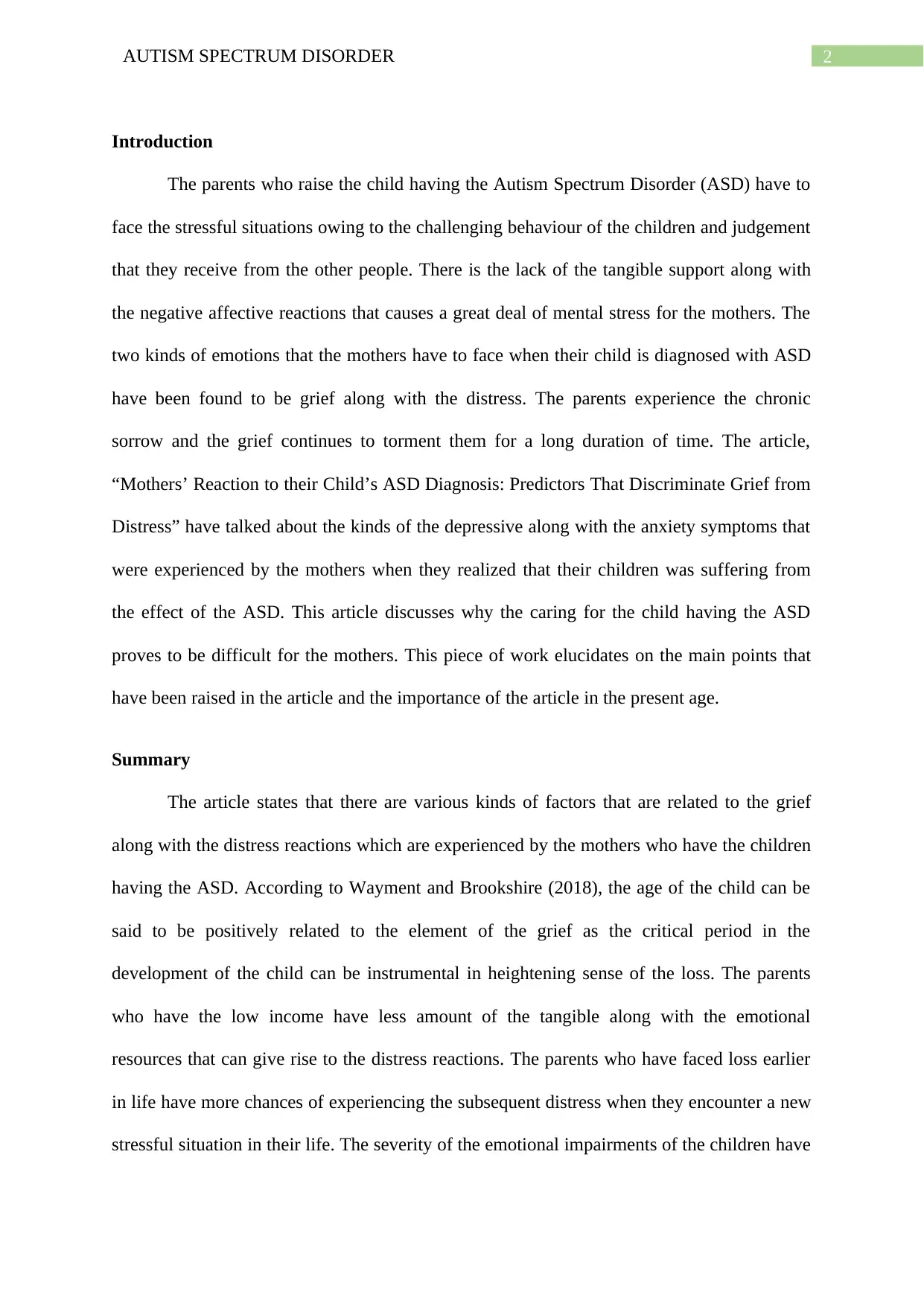
2AUTISM SPECTRUM DISORDER
Introduction
The parents who raise the child having the Autism Spectrum Disorder (ASD) have to
face the stressful situations owing to the challenging behaviour of the children and judgement
that they receive from the other people. There is the lack of the tangible support along with
the negative affective reactions that causes a great deal of mental stress for the mothers. The
two kinds of emotions that the mothers have to face when their child is diagnosed with ASD
have been found to be grief along with the distress. The parents experience the chronic
sorrow and the grief continues to torment them for a long duration of time. The article,
“Mothers’ Reaction to their Child’s ASD Diagnosis: Predictors That Discriminate Grief from
Distress” have talked about the kinds of the depressive along with the anxiety symptoms that
were experienced by the mothers when they realized that their children was suffering from
the effect of the ASD. This article discusses why the caring for the child having the ASD
proves to be difficult for the mothers. This piece of work elucidates on the main points that
have been raised in the article and the importance of the article in the present age.
Summary
The article states that there are various kinds of factors that are related to the grief
along with the distress reactions which are experienced by the mothers who have the children
having the ASD. According to Wayment and Brookshire (2018), the age of the child can be
said to be positively related to the element of the grief as the critical period in the
development of the child can be instrumental in heightening sense of the loss. The parents
who have the low income have less amount of the tangible along with the emotional
resources that can give rise to the distress reactions. The parents who have faced loss earlier
in life have more chances of experiencing the subsequent distress when they encounter a new
stressful situation in their life. The severity of the emotional impairments of the children have
Introduction
The parents who raise the child having the Autism Spectrum Disorder (ASD) have to
face the stressful situations owing to the challenging behaviour of the children and judgement
that they receive from the other people. There is the lack of the tangible support along with
the negative affective reactions that causes a great deal of mental stress for the mothers. The
two kinds of emotions that the mothers have to face when their child is diagnosed with ASD
have been found to be grief along with the distress. The parents experience the chronic
sorrow and the grief continues to torment them for a long duration of time. The article,
“Mothers’ Reaction to their Child’s ASD Diagnosis: Predictors That Discriminate Grief from
Distress” have talked about the kinds of the depressive along with the anxiety symptoms that
were experienced by the mothers when they realized that their children was suffering from
the effect of the ASD. This article discusses why the caring for the child having the ASD
proves to be difficult for the mothers. This piece of work elucidates on the main points that
have been raised in the article and the importance of the article in the present age.
Summary
The article states that there are various kinds of factors that are related to the grief
along with the distress reactions which are experienced by the mothers who have the children
having the ASD. According to Wayment and Brookshire (2018), the age of the child can be
said to be positively related to the element of the grief as the critical period in the
development of the child can be instrumental in heightening sense of the loss. The parents
who have the low income have less amount of the tangible along with the emotional
resources that can give rise to the distress reactions. The parents who have faced loss earlier
in life have more chances of experiencing the subsequent distress when they encounter a new
stressful situation in their life. The severity of the emotional impairments of the children have
⊘ This is a preview!⊘
Do you want full access?
Subscribe today to unlock all pages.

Trusted by 1+ million students worldwide
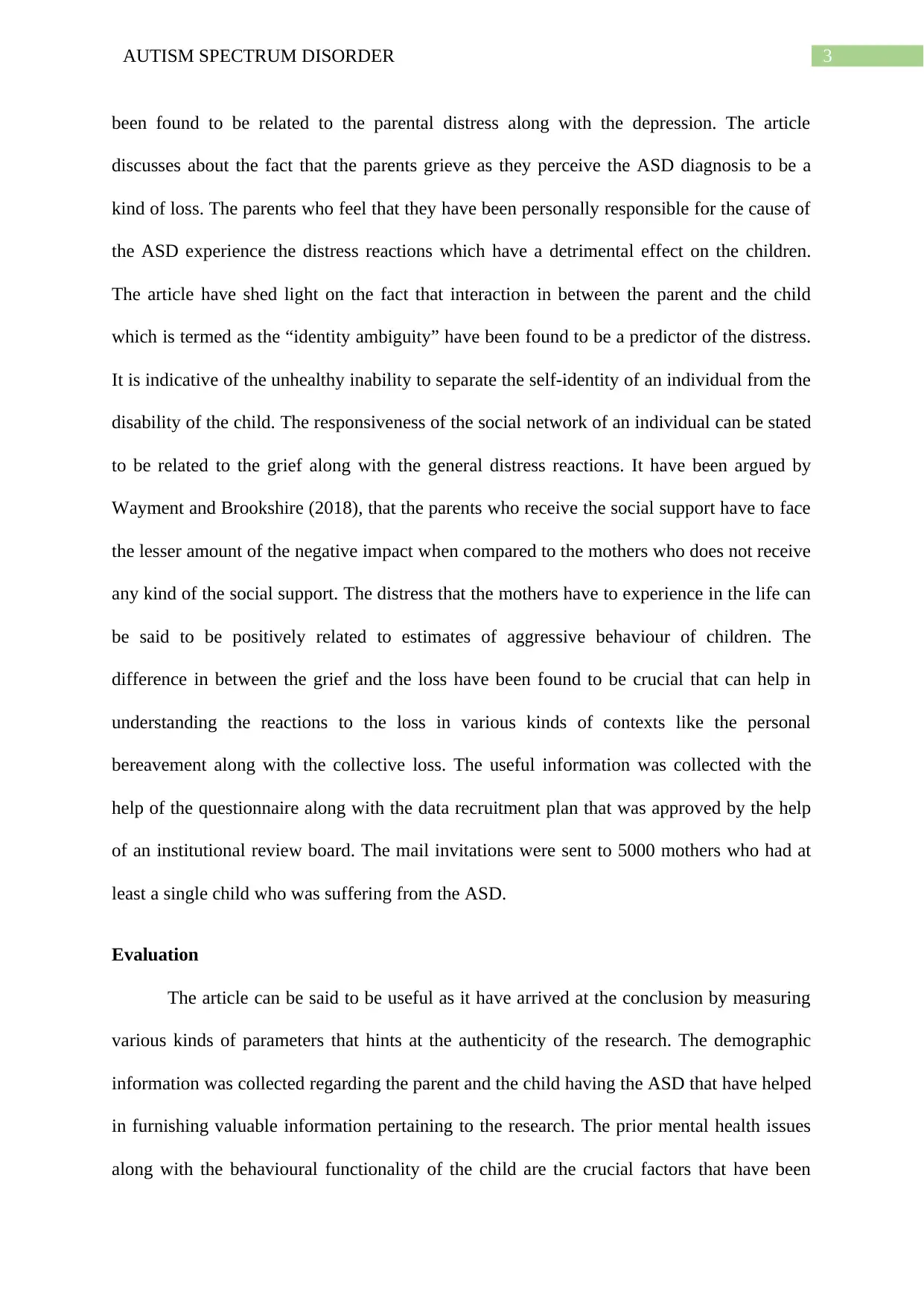
3AUTISM SPECTRUM DISORDER
been found to be related to the parental distress along with the depression. The article
discusses about the fact that the parents grieve as they perceive the ASD diagnosis to be a
kind of loss. The parents who feel that they have been personally responsible for the cause of
the ASD experience the distress reactions which have a detrimental effect on the children.
The article have shed light on the fact that interaction in between the parent and the child
which is termed as the “identity ambiguity” have been found to be a predictor of the distress.
It is indicative of the unhealthy inability to separate the self-identity of an individual from the
disability of the child. The responsiveness of the social network of an individual can be stated
to be related to the grief along with the general distress reactions. It have been argued by
Wayment and Brookshire (2018), that the parents who receive the social support have to face
the lesser amount of the negative impact when compared to the mothers who does not receive
any kind of the social support. The distress that the mothers have to experience in the life can
be said to be positively related to estimates of aggressive behaviour of children. The
difference in between the grief and the loss have been found to be crucial that can help in
understanding the reactions to the loss in various kinds of contexts like the personal
bereavement along with the collective loss. The useful information was collected with the
help of the questionnaire along with the data recruitment plan that was approved by the help
of an institutional review board. The mail invitations were sent to 5000 mothers who had at
least a single child who was suffering from the ASD.
Evaluation
The article can be said to be useful as it have arrived at the conclusion by measuring
various kinds of parameters that hints at the authenticity of the research. The demographic
information was collected regarding the parent and the child having the ASD that have helped
in furnishing valuable information pertaining to the research. The prior mental health issues
along with the behavioural functionality of the child are the crucial factors that have been
been found to be related to the parental distress along with the depression. The article
discusses about the fact that the parents grieve as they perceive the ASD diagnosis to be a
kind of loss. The parents who feel that they have been personally responsible for the cause of
the ASD experience the distress reactions which have a detrimental effect on the children.
The article have shed light on the fact that interaction in between the parent and the child
which is termed as the “identity ambiguity” have been found to be a predictor of the distress.
It is indicative of the unhealthy inability to separate the self-identity of an individual from the
disability of the child. The responsiveness of the social network of an individual can be stated
to be related to the grief along with the general distress reactions. It have been argued by
Wayment and Brookshire (2018), that the parents who receive the social support have to face
the lesser amount of the negative impact when compared to the mothers who does not receive
any kind of the social support. The distress that the mothers have to experience in the life can
be said to be positively related to estimates of aggressive behaviour of children. The
difference in between the grief and the loss have been found to be crucial that can help in
understanding the reactions to the loss in various kinds of contexts like the personal
bereavement along with the collective loss. The useful information was collected with the
help of the questionnaire along with the data recruitment plan that was approved by the help
of an institutional review board. The mail invitations were sent to 5000 mothers who had at
least a single child who was suffering from the ASD.
Evaluation
The article can be said to be useful as it have arrived at the conclusion by measuring
various kinds of parameters that hints at the authenticity of the research. The demographic
information was collected regarding the parent and the child having the ASD that have helped
in furnishing valuable information pertaining to the research. The prior mental health issues
along with the behavioural functionality of the child are the crucial factors that have been
Paraphrase This Document
Need a fresh take? Get an instant paraphrase of this document with our AI Paraphraser
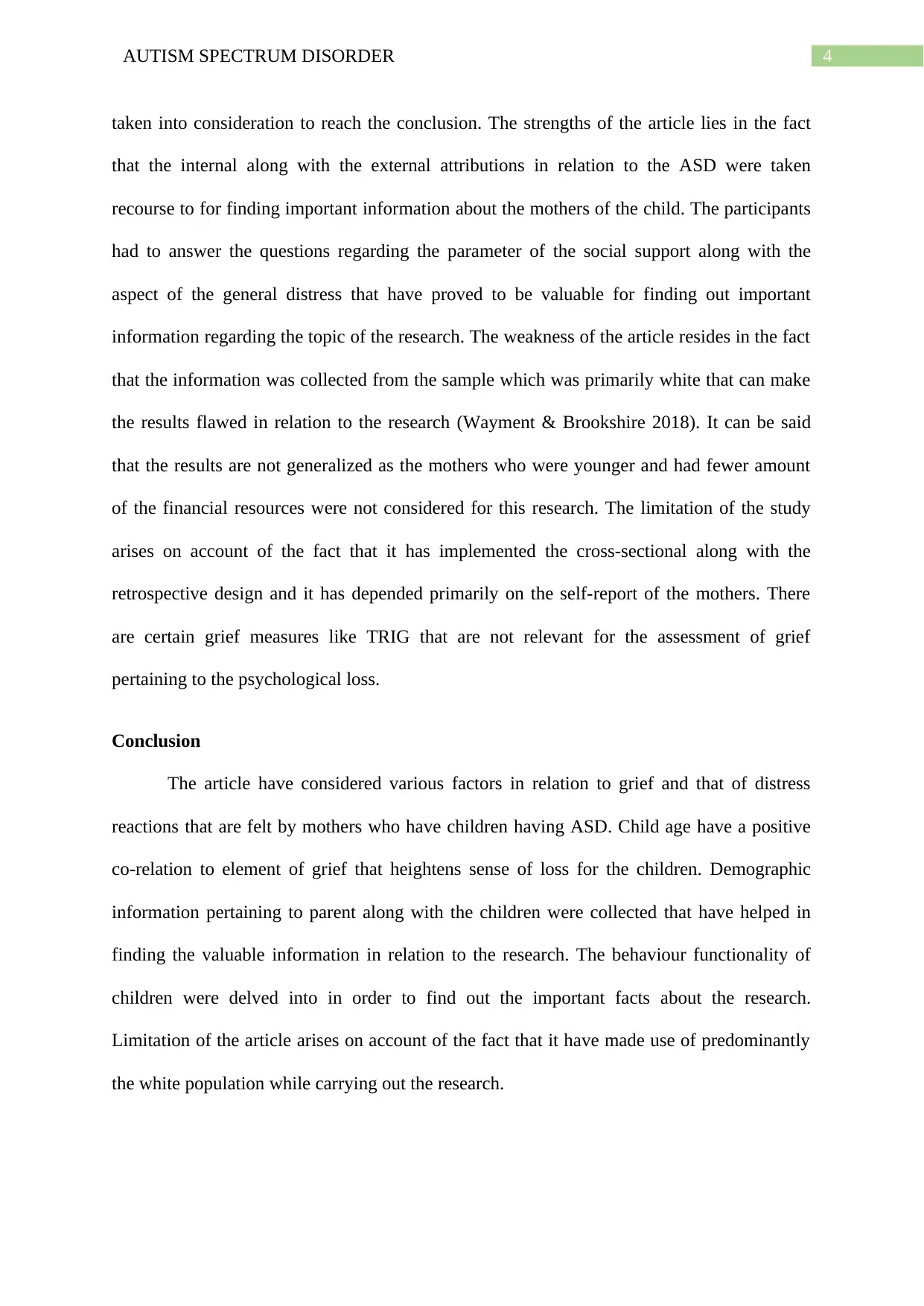
4AUTISM SPECTRUM DISORDER
taken into consideration to reach the conclusion. The strengths of the article lies in the fact
that the internal along with the external attributions in relation to the ASD were taken
recourse to for finding important information about the mothers of the child. The participants
had to answer the questions regarding the parameter of the social support along with the
aspect of the general distress that have proved to be valuable for finding out important
information regarding the topic of the research. The weakness of the article resides in the fact
that the information was collected from the sample which was primarily white that can make
the results flawed in relation to the research (Wayment & Brookshire 2018). It can be said
that the results are not generalized as the mothers who were younger and had fewer amount
of the financial resources were not considered for this research. The limitation of the study
arises on account of the fact that it has implemented the cross-sectional along with the
retrospective design and it has depended primarily on the self-report of the mothers. There
are certain grief measures like TRIG that are not relevant for the assessment of grief
pertaining to the psychological loss.
Conclusion
The article have considered various factors in relation to grief and that of distress
reactions that are felt by mothers who have children having ASD. Child age have a positive
co-relation to element of grief that heightens sense of loss for the children. Demographic
information pertaining to parent along with the children were collected that have helped in
finding the valuable information in relation to the research. The behaviour functionality of
children were delved into in order to find out the important facts about the research.
Limitation of the article arises on account of the fact that it have made use of predominantly
the white population while carrying out the research.
taken into consideration to reach the conclusion. The strengths of the article lies in the fact
that the internal along with the external attributions in relation to the ASD were taken
recourse to for finding important information about the mothers of the child. The participants
had to answer the questions regarding the parameter of the social support along with the
aspect of the general distress that have proved to be valuable for finding out important
information regarding the topic of the research. The weakness of the article resides in the fact
that the information was collected from the sample which was primarily white that can make
the results flawed in relation to the research (Wayment & Brookshire 2018). It can be said
that the results are not generalized as the mothers who were younger and had fewer amount
of the financial resources were not considered for this research. The limitation of the study
arises on account of the fact that it has implemented the cross-sectional along with the
retrospective design and it has depended primarily on the self-report of the mothers. There
are certain grief measures like TRIG that are not relevant for the assessment of grief
pertaining to the psychological loss.
Conclusion
The article have considered various factors in relation to grief and that of distress
reactions that are felt by mothers who have children having ASD. Child age have a positive
co-relation to element of grief that heightens sense of loss for the children. Demographic
information pertaining to parent along with the children were collected that have helped in
finding the valuable information in relation to the research. The behaviour functionality of
children were delved into in order to find out the important facts about the research.
Limitation of the article arises on account of the fact that it have made use of predominantly
the white population while carrying out the research.

5AUTISM SPECTRUM DISORDER
⊘ This is a preview!⊘
Do you want full access?
Subscribe today to unlock all pages.

Trusted by 1+ million students worldwide
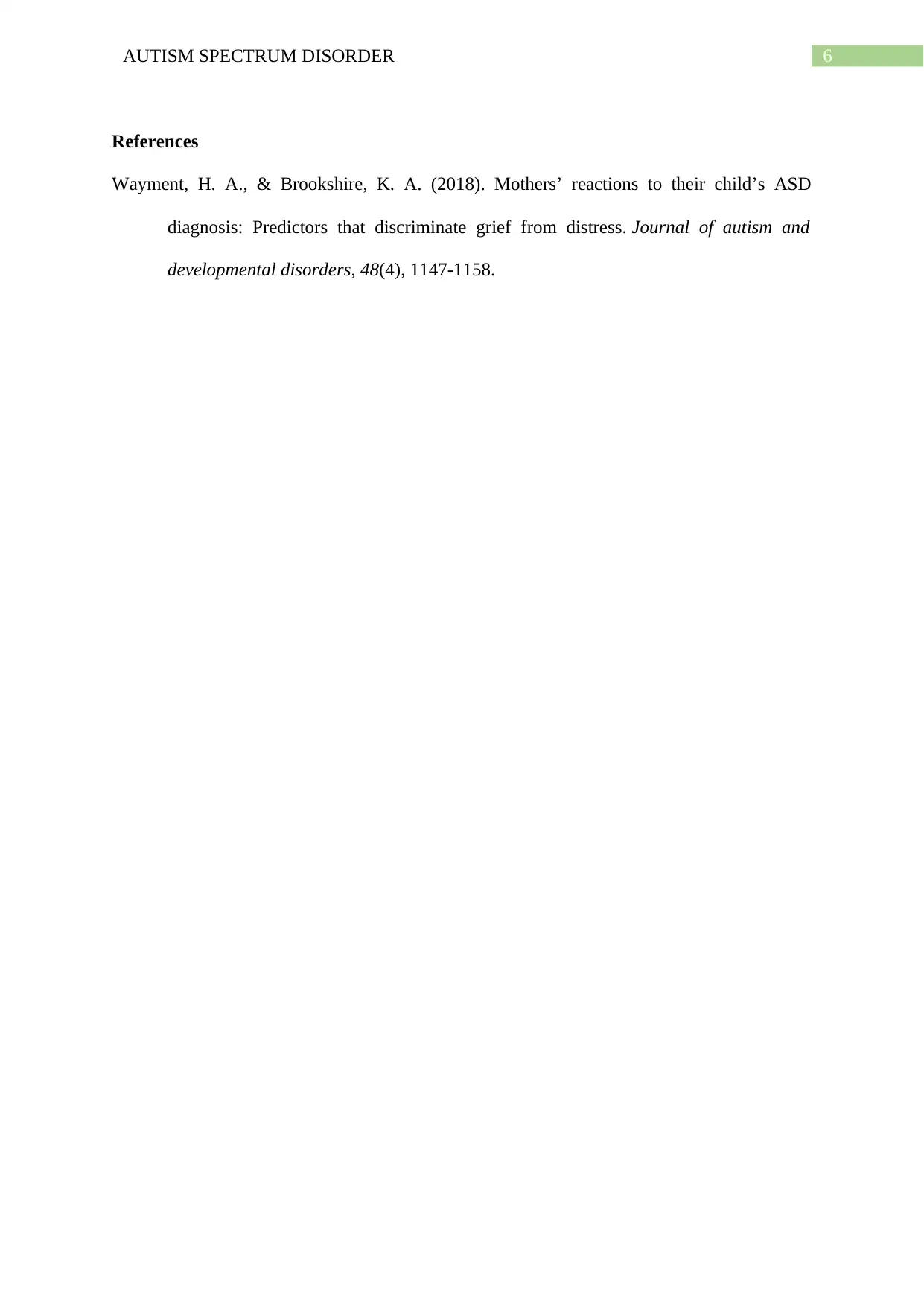
6AUTISM SPECTRUM DISORDER
References
Wayment, H. A., & Brookshire, K. A. (2018). Mothers’ reactions to their child’s ASD
diagnosis: Predictors that discriminate grief from distress. Journal of autism and
developmental disorders, 48(4), 1147-1158.
References
Wayment, H. A., & Brookshire, K. A. (2018). Mothers’ reactions to their child’s ASD
diagnosis: Predictors that discriminate grief from distress. Journal of autism and
developmental disorders, 48(4), 1147-1158.
1 out of 7
Related Documents
Your All-in-One AI-Powered Toolkit for Academic Success.
+13062052269
info@desklib.com
Available 24*7 on WhatsApp / Email
![[object Object]](/_next/static/media/star-bottom.7253800d.svg)
Unlock your academic potential
Copyright © 2020–2025 A2Z Services. All Rights Reserved. Developed and managed by ZUCOL.




